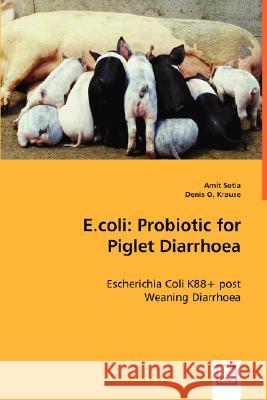E.coli: Probiotic for Piglet Diarrhoea » książka
E.coli: Probiotic for Piglet Diarrhoea
ISBN-13: 9783639026276 / Angielski / Miękka / 2008 / 116 str.
Aim of this study was to select environmental E. coli isolates that produced colicins against the swine pathogen E. coli K88+. In initial evaluation using a modified plate method with 18 colicinogenic E. coli constructs, colicins E3, E4, E5, E9, Ia, K and N were found to possess inhibitory activity against 12 ETEC K88+ strains. A total of 463 environmental isolates from cattle rumen, cattle feces, pig feces and hog manure-amended soil were screened for colicin production by a modified plate test. Further, colicinogenic isolates were screened for five toxin genes LT, STa, STb, VT1 and VT2 as well as K88 (F4) fimbriae using PCR reactions. Fourteen non-pathogenic isolates were subjected to characterization of colicin genes by PCR using 9 new primer sequences, antibiotic susceptibilities and substrate utilization. Two potential probiotic strains of E. coli, UM-2 and UM-7 which produced colicins that could utilize potato starch and inulin were selected for in-vitro competition with E. coli K88+ strain 2-12. In vitro competition between the synbiotics and E. coli K88+ revealed inhibition of E. coli K88+. Animal testing of these strains is currently being undertaken."
Aim of this study was to select environmental E. coli isolates that produced colicins against the swine pathogen E. coli K88+. In initial evaluation using a modified plate method with 18 colicinogenic E. coli constructs, colicins E3, E4, E5, E9, Ia, K and N were found to possess inhibitory activity against 12 ETEC K88+ strains. A total of 463 environmental isolates from cattle rumen, cattle feces, pig feces and hog manure-amended soil were screened for colicin production by a modified plate test. Further,colicinogenic isolates were screened for five toxin genes LT, STa, STb, VT1 and VT2 as well as K88 (F4) fimbriae using PCR reactions. Fourteen non-pathogenic isolates were subjected to characterization of colicin genes by PCR using 9 new primer sequences, antibiotic susceptibilities and substrate utilization. Two potential probiotic strains of E. coli, UM-2 and UM-7 which produced colicins that could utilize potato starch and inulin were selected for in-vitro competition with E. coli K88+ strain 2-12. In vitro competition between the synbiotics and E. coli K88+ revealed inhibition of E. coli K88+. Animal testing of these strains is currently being undertaken.











